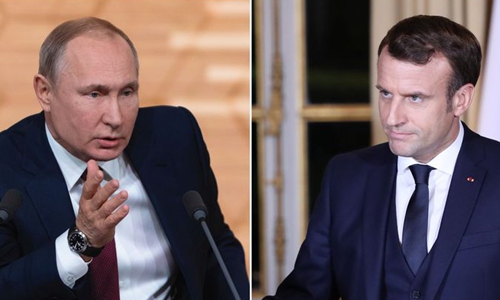France and Russia benefit from special relationship
By Cui Heng Source: Global Times Published: 2020/7/9 21:13:40

Xinhua file photos of Russian President Vladimir Putin and French President Emmanuel Macron
On June 27, French President Emmanuel Macron announced he would visit Russia to discuss regional security, regional conflicts, climate change and other issues with President Vladimir Putin. Just one day before, Macron and Putin held a video call to discuss a number of bilateral and international issues, including crises in Ukraine, Libya and Syria.If Macron's Russia visit goes smoothly, it will be the seventh meeting between the two leaders since Macron took office in May 2017. Given that relations between Russia and some major Western countries have been at a low point for a long time after the Ukraine crisis, it is not easy to have such frequent interactions between top leaders of Russia and France.
Anyone familiar with the history of international relations during the Cold War knows that even during that icy period, when relations between the West and the Soviet Union were strained, former French president Charles de Gaulle attempted to establish a "special partnership" with the Soviet Union. The coexistence of the close Franco-Soviet relationship and the bipolar structure was in line with the purpose of the Soviet Union to drive a wedge in the Western camp and the purpose of France to maintain its great power status.
It formed a win-win situation between France and the Soviet Union. The special relationship between the two sides during the Cold War laid a foundation for their later relationship.
Macron has attached great importance to France's relationship with Russia. For instance, he hosted Putin at the Versailles Palace at the beginning of his tenure, led a business delegation to the St. Petersburg International Economic Forum, and stressed the importance of Russia in solving the Syrian crisis and the Iran nuclear crisis on many occasions. More importantly, Macron would like to visit Russia even during the ongoing pandemic. It can be said that the special partnership between France and Russia remains strong.
France's policy toward Russia reflects what European countries have gradually realized: The West has failed to encircle and suppress Russia after the Ukraine crisis, and the degree of interdependence between Europe and Russia is higher than that between the US and Russia. In this context, Berlin and Paris are both adjusting their policies toward Moscow.
This suits Moscow well. On July 1, Russia completed a referendum on a constitutional amendment. This marks a new period of rapid adjustment of power structuring and personnel in Russia. Naturally, Russia does not want to put too much energy on external affairs during this period.
In fact, Russia has always had high hopes for France since the onset of the Ukraine crisis. Although France canceled the sale of amphibious assault ships to Russia, Russia's countermeasures against France were different from those advanced against the US and the UK.
The COVID-19 pandemic has brought new changes to the international situation and Russia is reacting accordingly with measured diplomacy. Russia's foreign policy has strengthened its emphasis on multilateralism.
However, Russia and other European powers face obstacles with this new detente of sorts. The Ukraine issue presents the biggest hurdle. If the Ukraine issue can move forward in a positive direction under the mediation of France and Russia, it will undoubtedly be of great benefit to the consolidation of Franco-Russian relations. Although Paris intends to mediate between Moscow and Kiev, there is limited room for negotiation. After all, neither Russia nor Ukraine is likely to make concessions.
France, as a European leader, also needs to take care of the feelings of its followers in Europe. Undoubtedly diplomats from Paris and Moscow will further bask in each other's glow amid the backdrop of growing US isolationism. Then again, both will have to keep in mind that substantial progress of their special partnership will be hard to achieve.
The author is a post-doctorate researcher from the Centre for Russian Studies, East China Normal University. opinion@globaltimes.com.cn
Posted in: VIEWPOINT